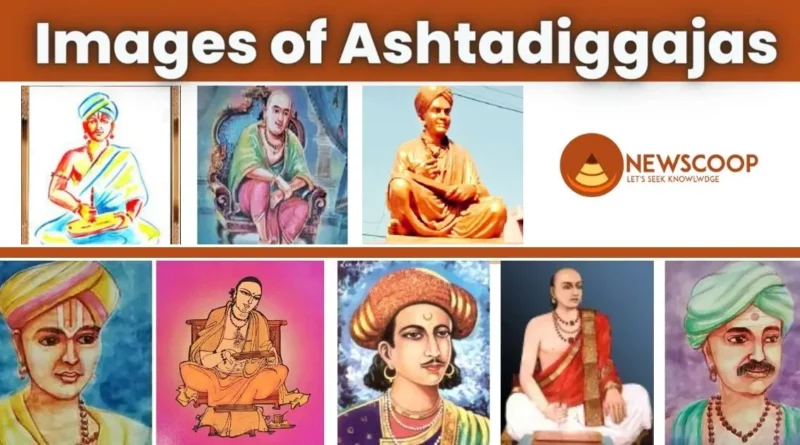Ashtadiggajas: Meaning, Names, and Images
Table of Contents
What are Ashtadiggajas?
Ashtadiggajas, also known as the “eight elephants,” were a group of eight highly respected poets in the court of the ancient South Indian king Krishnadevaraya, who ruled the Vijayanagara Empire during the 16th century.
The term “Ashtadiggajas” is derived from two words:
- “Ashta”, meaning eight
- “Diggajas”, meaning elephants, represent the eight directions.
These poets were considered the most eminent scholars of their time, known for their exceptional skills in poetry, music, dance, and literature. They were central figures in the intellectual and cultural traditions of the Vijayanagara Empire, and their literary works have continued to inspire people in South India.
Meaning of Ashtadiggajas
The meaning of Ashtadiggajas revolves around eight poets, each symbolizing wisdom and creativity, much like elephants representing strength and knowledge in all eight directions. Their contributions to literature, especially in Telugu, have shaped the cultural and intellectual landscape of South India for generations.
Ashtadiggajas Names and Images
Following are the names and images of the Ashtadiggajas:
- Allasani Peddana.
- Nandi Thimmana.
- Madayyagari Mallana.
- Dhurjati.
- Ayyalaraju Ramambhadrudu.
- Pingali Surana.
- Ramarajabhushanudu.
- Tenali Ramakrishna.

The Ashtadiggajas, the group of eight eminent poets in the court of the Vijayanagara Empire, are renowned for their literary contributions and cultural impact. They were not only masters of Telugu poetry but also celebrated for their knowledge of music, dance, and literature.
Through their works, the Ashtadiggajas celebrated the cultural heritage of South India, championed the Telugu language, and explored a wide range of topics from religion and philosophy to ethics and politics. Their poetic expressions have continued to inspire generations and have played a vital role in shaping the Telugu language and literature.
The Ashtadiggajas left an indelible mark on the Vijayanagara Empire and its people, and their legacy continues to resonate in South India’s cultural and intellectual traditions. Their works remain relevant and admired to this day, and they will forever be remembered as the literary giants who helped shape the cultural identity of South India.
Thank You!

